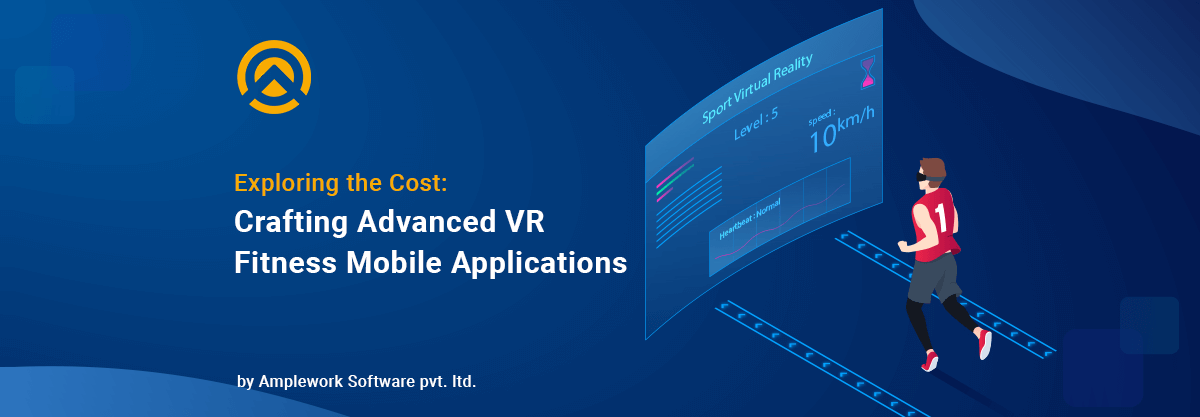Health is one of the highly considered factors by the users in the current scenario. Which is becoming increasingly popular. This growth has only become possible because of the technological integration in the same sector. The implementation of technologies like artificial intelligence, machine learning, and Augmented & virtual reality. All these technological considerations have led to an increase in the growth rate of healthcare solutions that are geared up with the latest technological advancements. Helping the individuals stay and remain healthy. There are a range of healthcare apps that are created as a blend of technologies with healthcare functionalities. This AR & VR tech stack leads the healthcare industry to prowess the capabilities of virtual consultation and treatment in most cases.
These VR aspects bring up high-end advancements in terms of comprehensive features and functionalities in the app. Enhancing the new possibilities for the same. Since the increase in the need for smart healthcare apps, it is most important to clearly understand the cost of crafting such apps. Understanding the costs of developing an advanced healthcare app is crucial for both businesses and startups who are looking to create the same for their users. There are a wide range of necessary factors that affect the costs, including its design, development, integration, and maintenance. Considering these factors we will derive the cost to craft an advanced virtual reality fitness mobile app.
Blog Motive
With this blog, we will be going to decode the considerations and mechanisms that affect the pricing for fitness app development. Considering all the advanced features and functionalities that it must have. We will also be going to explore the key components and considerations that are involved in the development process. So considering these factors that are contributing to the fitness mobile app development will bring out the cost and investment required for the same.
Some Statistical Chronologies
The global mHealth app market has gradually witnessed growth over the past few years till now. We have gone through a research report generated by a well-known research organization that is “Grand View Research” According to the data that this organization derives the global mHealth apps market size was valued at approximately $43.5 billion in the year 2022. Also, this market is expected to witness an annual growth rate that is CAGR rate of approximately 11.6% from the year 2024 to 2030. All this is because of the growing adoption of fitness and medical apps that are used to collect and track individuals’ health effectively. This health-related data has also shown the improvisation in the health of individuals who are using such apps on their smartphones.
 Source: Grand View Research
Source: Grand View Research
How Crafting Virtual Reality Fitness Apps Are Advantageous
We have now understood that virtual reality fitness apps are one of the highest growth-achieving platforms these days. These apps are a combination of technological considerations and Fitness and healthcare aspects for the users. Transforming the way how these individuals approach physical wellness. Here’s how VR mobile apps are advantageous making the VR fitness apps worthwhile for both businesses and individuals.
1. Efficient Activity Tracker
A VR fitness mobile is equipped with a feature that is used for tracking fitness activities and setting your goals according to the requirements. It can effectively keep track of fitness levels and activities like cycling, gymming, and running. Allowing the users to analyze their physical fitness levels and performance with higher accuracy and efficiency.
2. Personalized Training
The VR fitness solutions are equipped with a range of specific and personalized training and exercises according to your health conditions. So if you need to achieve specific fitness goals these personalized workout plans can be easily customized according to the individual’s progress ensuring continuous physical improvement in them.
3. Wearable Device Integration
These VR fitness apps allow the sync with different wearable devices like smartwatches, wristbands, and VR headsets. This seamless syncing provides precise data on health metrics like heart rate, O2 level monitor, calories burned, step count, and blood pressure monitoring system.
4. Real-Time Data Analytics
VR fitness apps comprise a completely advanced and real-time data analytics feature that allows users to track their real-time fitness data insights. Helping the users in monitoring and transforming their regimes of physical fitness training. Data analytics feature helps individuals effectively keep track of their physical routine and also the businesses to analyze the user’s behavior and needs.
The fitness app developers incorporate social media features into VR fitness mobile apps. Allowing all its users to share their physical considerations and achievements on their respective social media handles. This aspect adds to the user’s engagement and fun for the individuals offering them a competitive advantage of being fit.
6. Security
We all are aware that VR fitness mobile applications comprise bulk data that belongs to a wide range of individuals. Just because of this, the data safety of such users becomes equivalently important. That’s the reason why this app comprises a multi-layered security structure, limiting their vulnerabilities and providing them complete security against various cyber threats like unauthorized access, data breaches, and many others.
Read more: Building a Fitness App: A Step-by-Step Development Roadmap
Factors Affecting the Cost of Advanced VR Fitness Applications
The VR fitness mobile app development process involves a wide variety of factors that contribute towards the overall investment incurred in developing advanced fitness apps. Here are some of the factors that impact the cost of development of Advanced VR Apps.

1. Features & Complexity
Most of the top fitness app development services consider the cost of crafting advanced fitness apps depending on factors such as features and functionalities required by the users as well as their complexity. These apps comprise a wide range of features and functionalities like GPS tracking, health tracking, personalized training, social networking connectivity, and physical activity tracking. All these features require a lot of resources and consume time. That’s the major reason why these are considered as the major factors affecting the development cost.
2. Integration with Wearable Devices
Integrating the fitness mobile app with wearable devices such as VR headsets, smartwatches, and wristbands increases the development complexity for the same. This integration process ensures seamless real-time health monitoring and data synchronization from the wearable devices to apps. When you consider fitness app development, integrating them with wearable devices is a must, allowing the users to keep a real-time track of their fitness progress.
Platform selection is considered one of the major aspects that affect the cost of creating full-fledged VR fitness solutions. Selecting between iOS and Android or whether the user needs the app on both platforms is a cross-platform app. Since each of the platforms requires unique coding standards that affect the cost gradually. IOS might have some unique specializations and design aspects when compared to Android which is a flexible and diverse platform. Cross-platform fitness app development attracts a wide range of audiences and requires larger resources as well. It depends on the user’s requirements and targeted audiences.
4. Maintenance & Upgradation
Continuous maintenance and upgradation according to the scalability of the fitness mobile apps also attract the development cost. We all are aware that with the growth in user base, the fitness apps also need to be upgraded and optimized accordingly. Also, regular updates make the app always remain ahead of the competition in the market. As it keeps the app inclusive of the latest trends and technological considerations. Similarly, the app maintenance ensures the app remains bug and error-free for better user experience.
5. Geographical Development Area
The location from where you are hiring the mobile fitness app developers is one of the most important criteria for businesses. The hourly rates of the developers according to the geographical locations always vary accordingly. For example, when you hire a mobile app developer from the north zone that is western Europe and North America the developers are costly there as compared to the other regions globally. When you hire dedicated developers from Asian region then the hiring costs are a bit cheaper than the North ones.
6. VR Hardware Integration
Considering the cost of VR headsets crafting the app that is compatible with all of such VR devices will impact the development costs. Also, if your fitness mobile app requires the users to interact with the environment using hand motions and gestures factors in the cost of motion controllers. These hardware devices are highly advanced and creating an advanced solution affects the cost as well.
7. Data Security & Privacy
We all are aware of the significance of compliance standards. These standards are important in terms of user data security and privacy. Ensuring the app complies with data protection and privacy regulations and implementing multi-layered security measures for effectively safeguarding the user’s data is important and impacts the costs of virtual reality fitness app development.
Read more: Breaking a Sweat Digitally: Mobile App Trends in the Fitness World
The Cost To Create an Advanced Mobile Fitness App
An advanced VR-integrated fitness mobile app development cost is influenced by a variety of factors that affect the costs. Whenever the user requires a basic fitness mobile app with limited features and complexities it will range from $45,000 to $60,000. Similarly when the user needs a VR fitness app with a moderate amount of features and functionalities then it comes to approximately $80,000 to $150,000. Finally, when it comes to an advanced mobile application development the cost ranges between $200,000 to $500,000.
The costing factor is also dependent on the geographical regions from where you are hiring a developer. When you have chosen regions like Europe, the cost for the came goes to approximately $145,000 to $600,000. Whereas when you hire a developer from a country like India then the cost ranges from approximately $45,000 to $300,000 which is much lower when compared to other geographies. Generating higher profits and incurring lower costs for crafting advanced VR fitness apps requires consideration of such factors that affect the development costs.
Wrapping Up
Crafting a VR advanced fitness app lets your business incur a lot of costs if you are not considering the above-mentioned factors. These factors are the ones that help you understand the aspects that can both increase the development costs as well as reduce them. Considering the factors like app complexity, desired features and functionalities, targeted audiences, and your business goals. Conducting thorough market research and creating a detailed plan for the same helps you in generating the specific cost associated with the advanced VR fitness mobile app development.
Amplework is a place where developers specialize in developing the most efficient and futuristic VR fitness apps. We only consider the user-centric development approach followed by understanding user’s requirements to craft the perfect solutions for them. Our experts possess expertise in serving our clients with the most affordable solutions, providing complete transparency and efficiency. Amplework’s Knowledge base of working with the latest technologies. Allows us to create completely advanced solutions that resonate with all your targeted audiences. That’s the reason why choosing Amplework will be the best and most affordable experience. Just because we are committed to delivering you complete satisfaction in terms of perfectly aligned solutions.
Related blog: How Much Does it Cost To Develop a Mobile Application?
FAQ’s
1. What is the cost to craft a VR fitness mobile application?
Ans. The cost of creating a VR fitness mobile application varies depending on a wide range of factors like features and complexity, and geographical location of the developers, technological selection, and many other aspects. It starts from basic which is approximately $45,000 to advanced which goes to approximately $500,000.
2. Can you list the range of factors that affect the development cost of VR fitness apps?
Ans. There are a wide range of factors that affect mobile app development costs. These factors are platform selection, complexity, advanced features and functionalities, design intricacies, geographical boundaries, and security compliance. These are some of the major factors that gradually affect development costs.
3. How much time will take to develop an advanced VR fitness mobile application?
Ans. It is not fixed at all, as it completely relies on a wide range of factors. If you need to create an app with basic functionalities then the time will be ranges from 6 to 8 months. Whereas, when it comes to an advanced mobile app development the time ranges to approximately 8-15 months for its development.
4. What are the advantages of VR fitness applications?
Ans. A VR fitness mobile app offers the most efficient workout experience for the users. With the inclusion of advanced features and functionality, it offers an immersive user experience to the individuals performing the exercises. Enhancing their motivation levels towards fitness.
5. Are there any specific VR hardware requirements for connecting with the app?
Ans. We create fitness apps that can effectively establish connectivity with a wide range of the latest VR headsets. It is only specific when you need the motion controller for the same. Our mobile app developers aim for compatibility with a wide range of VR hardware to maximize the app’s accessibility.










